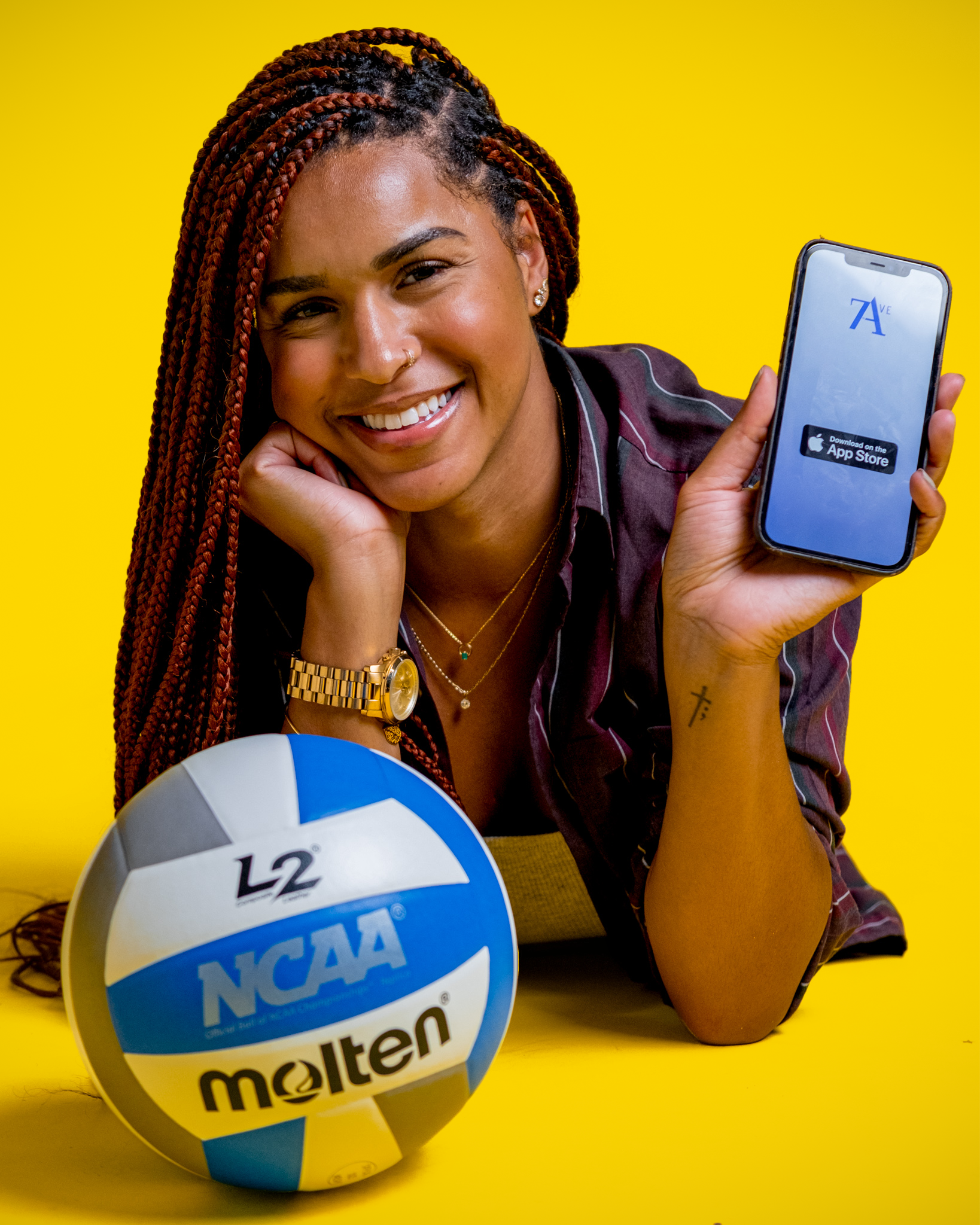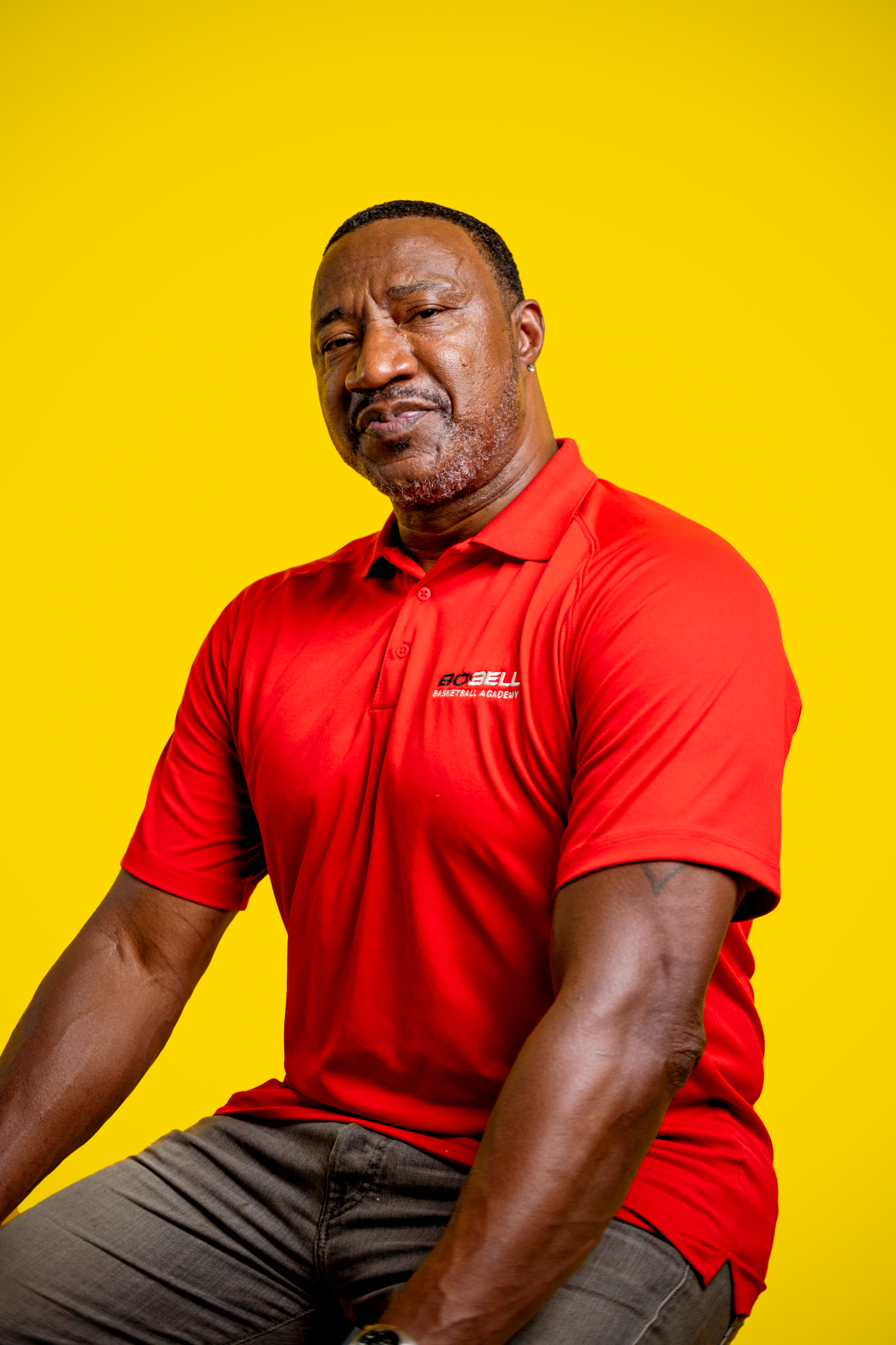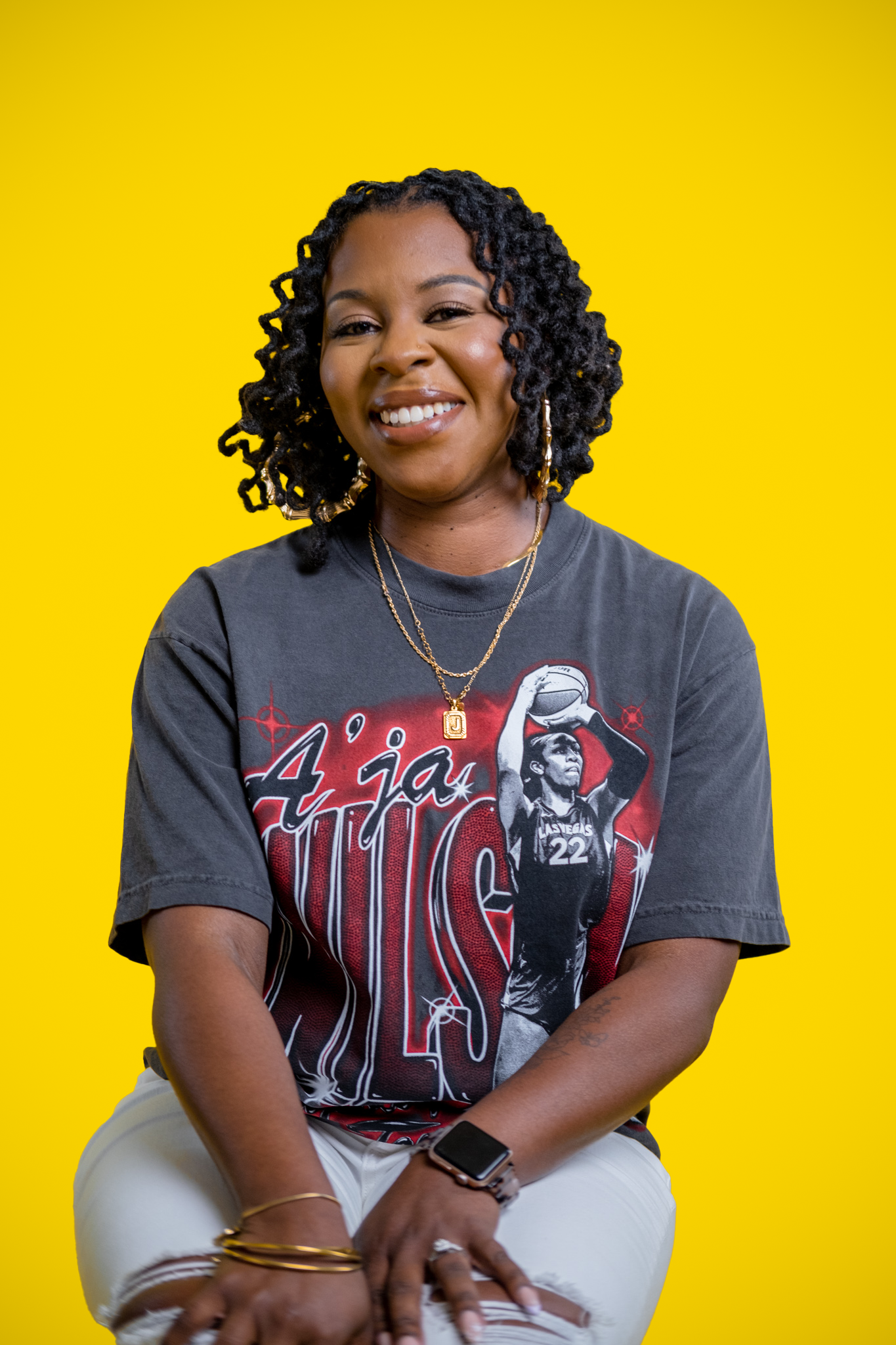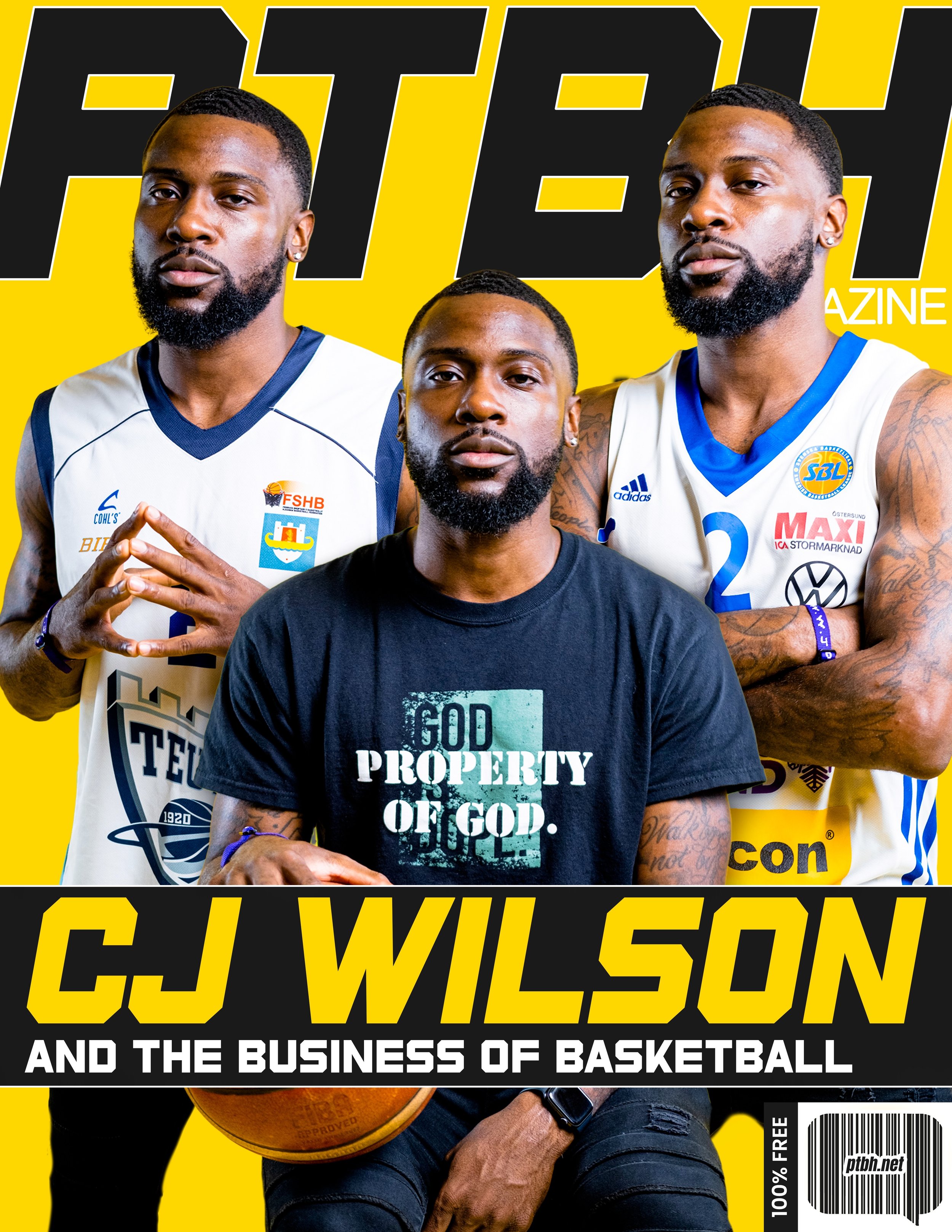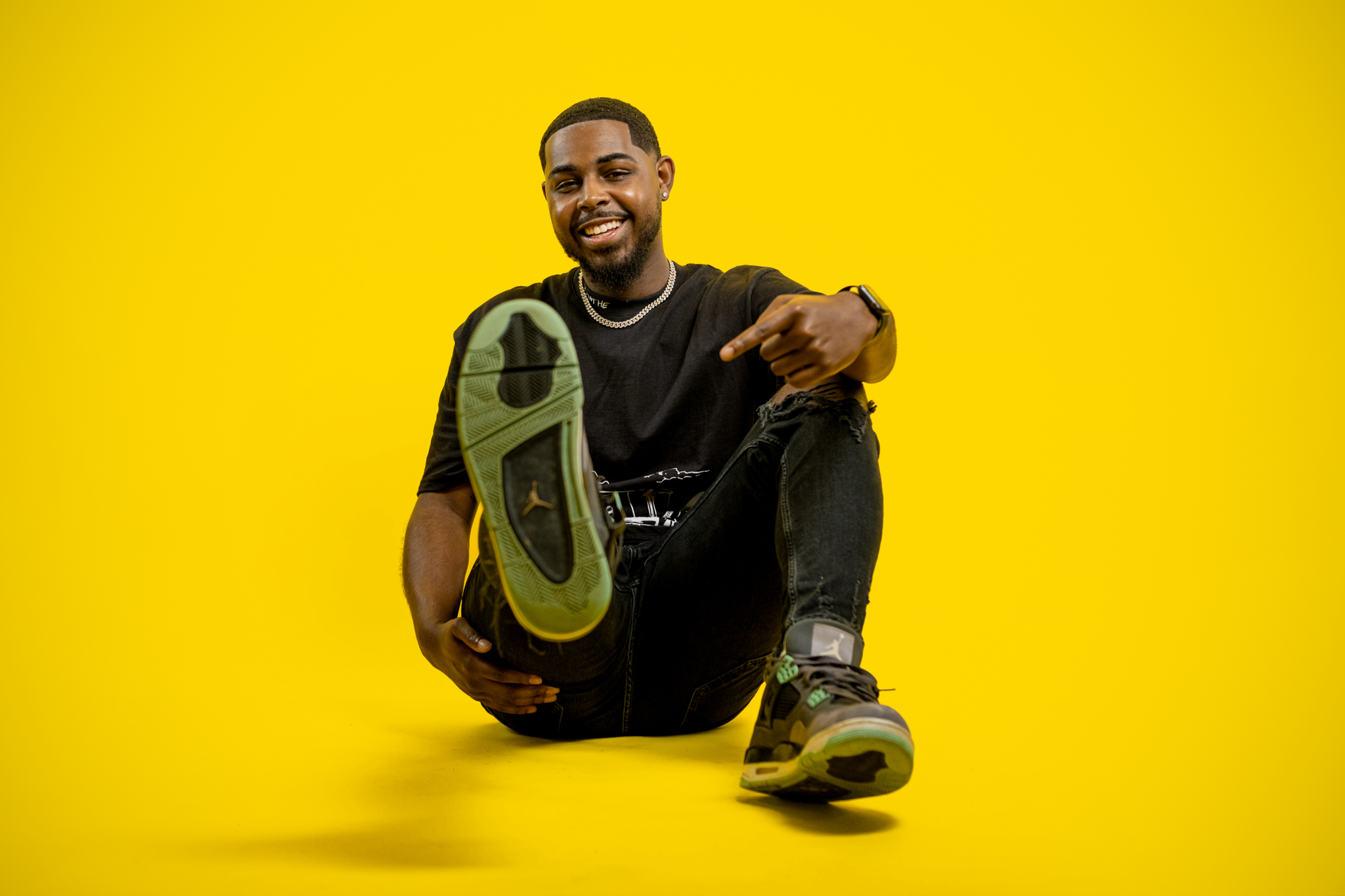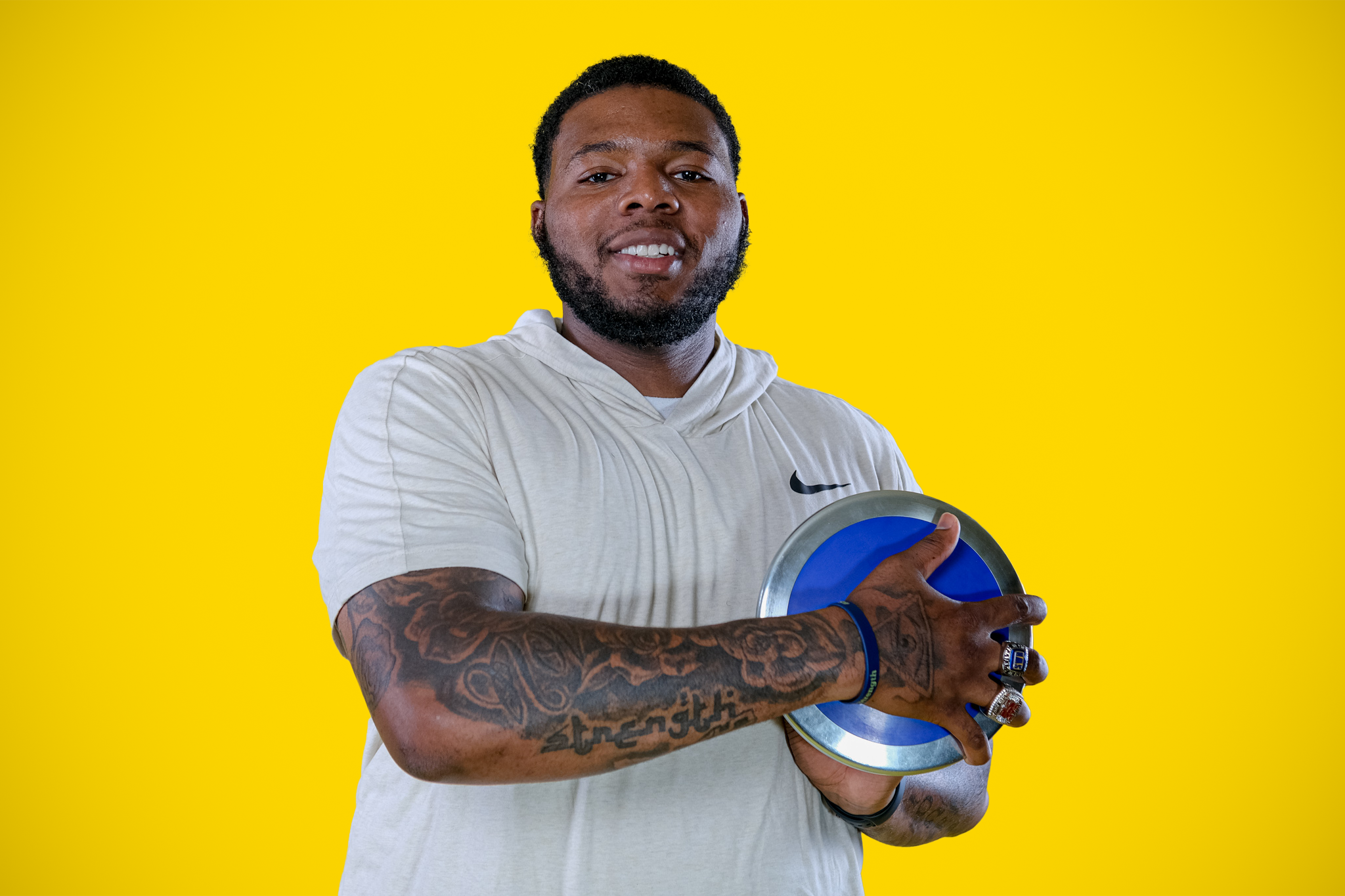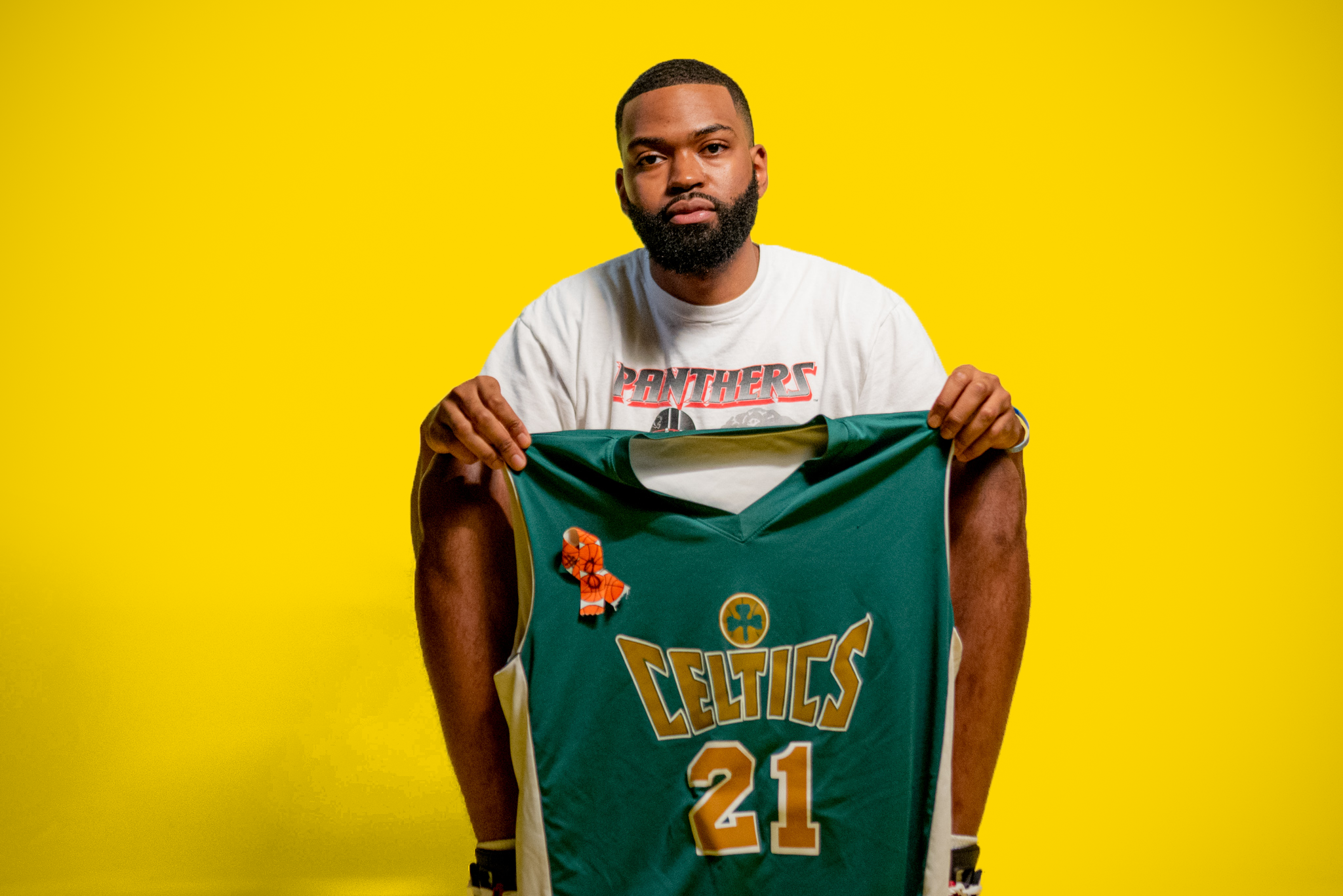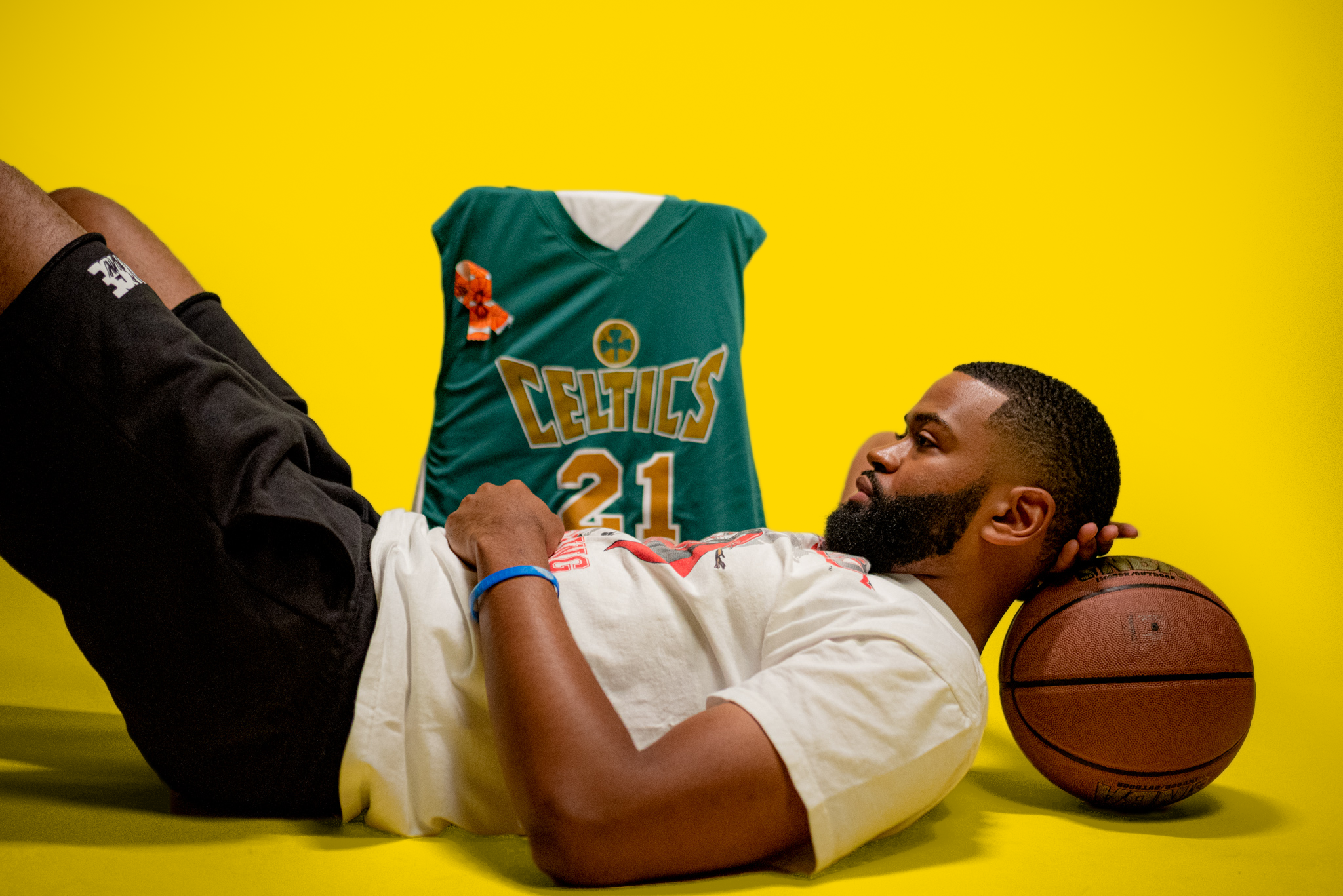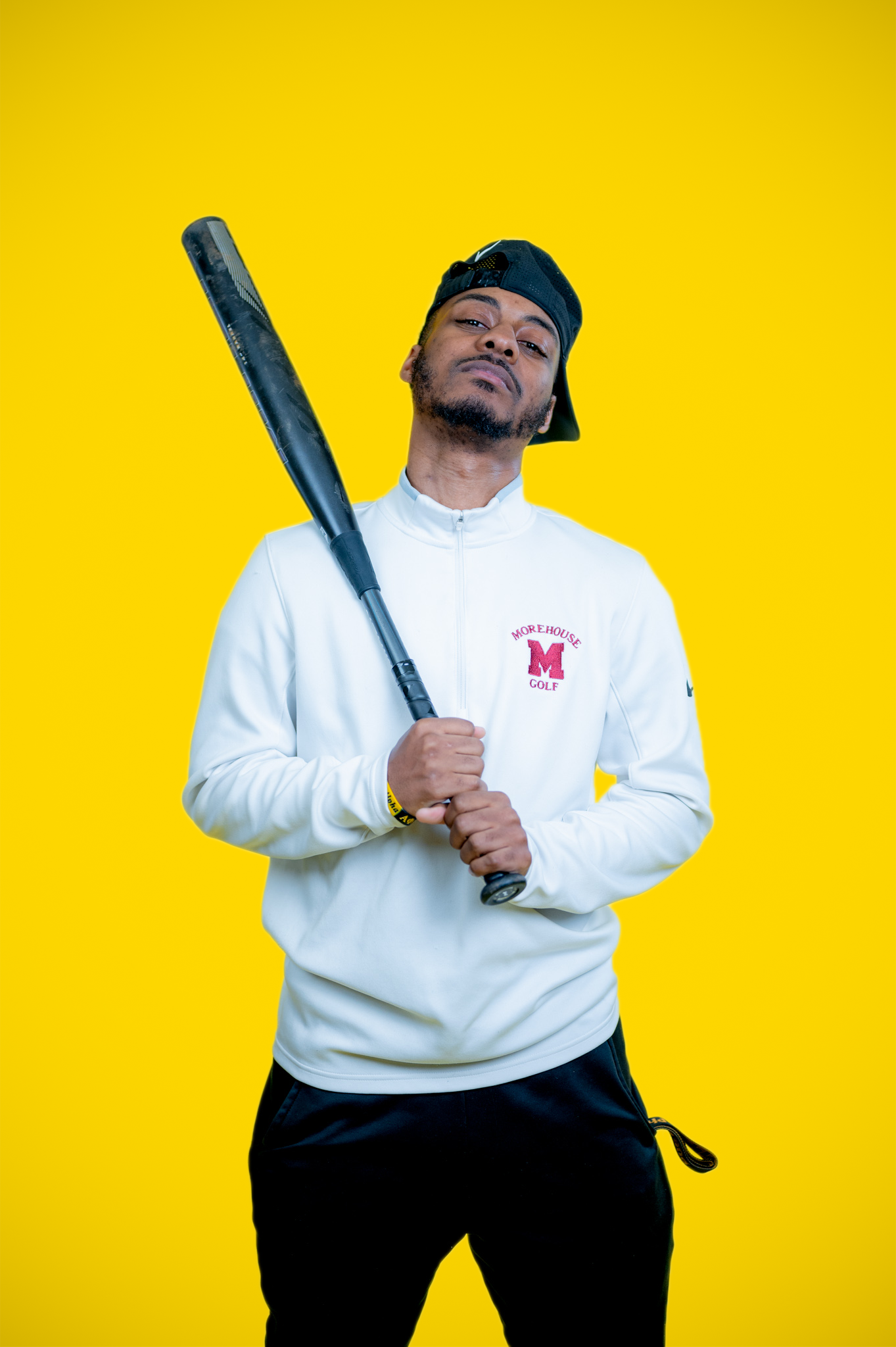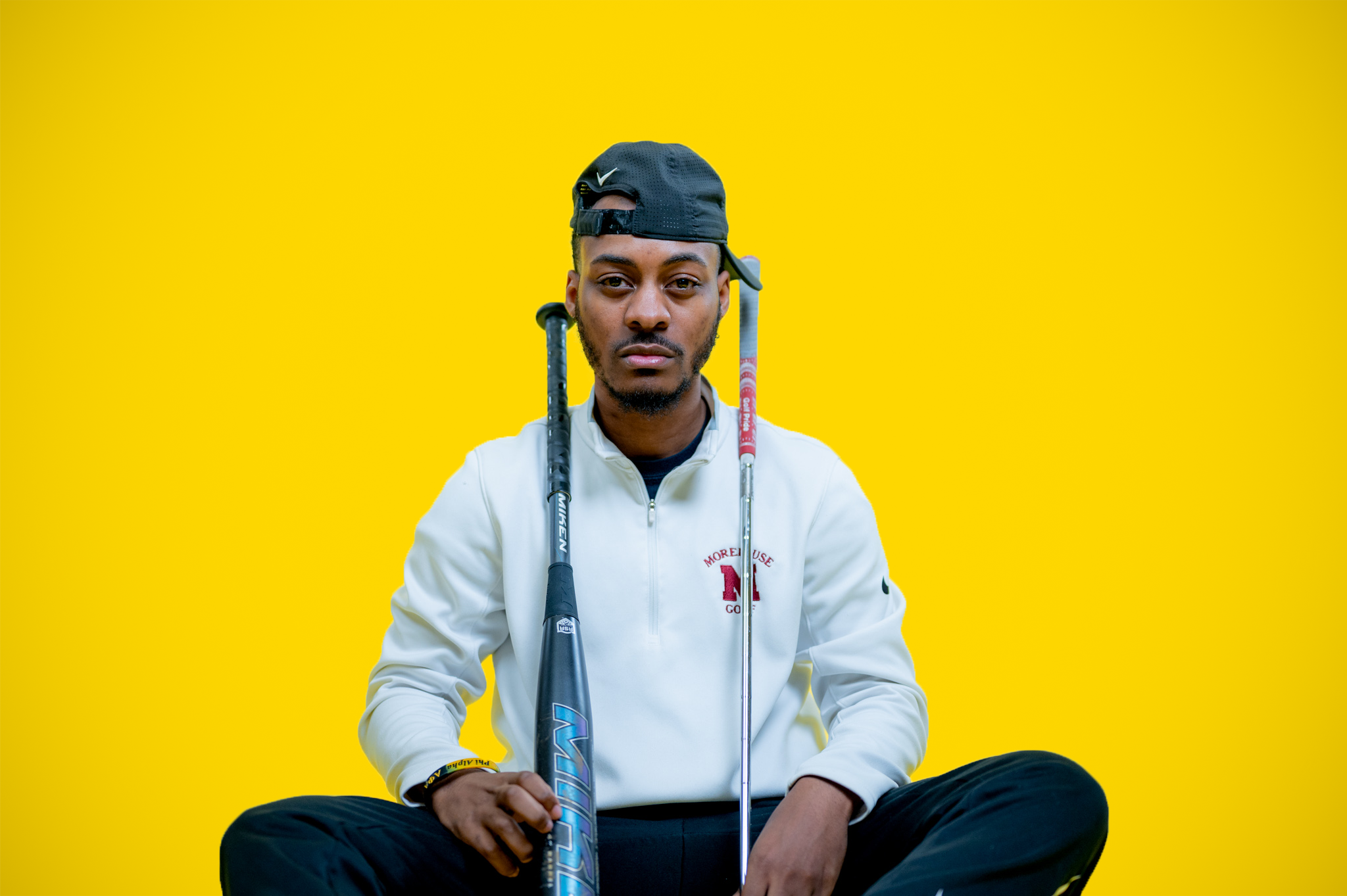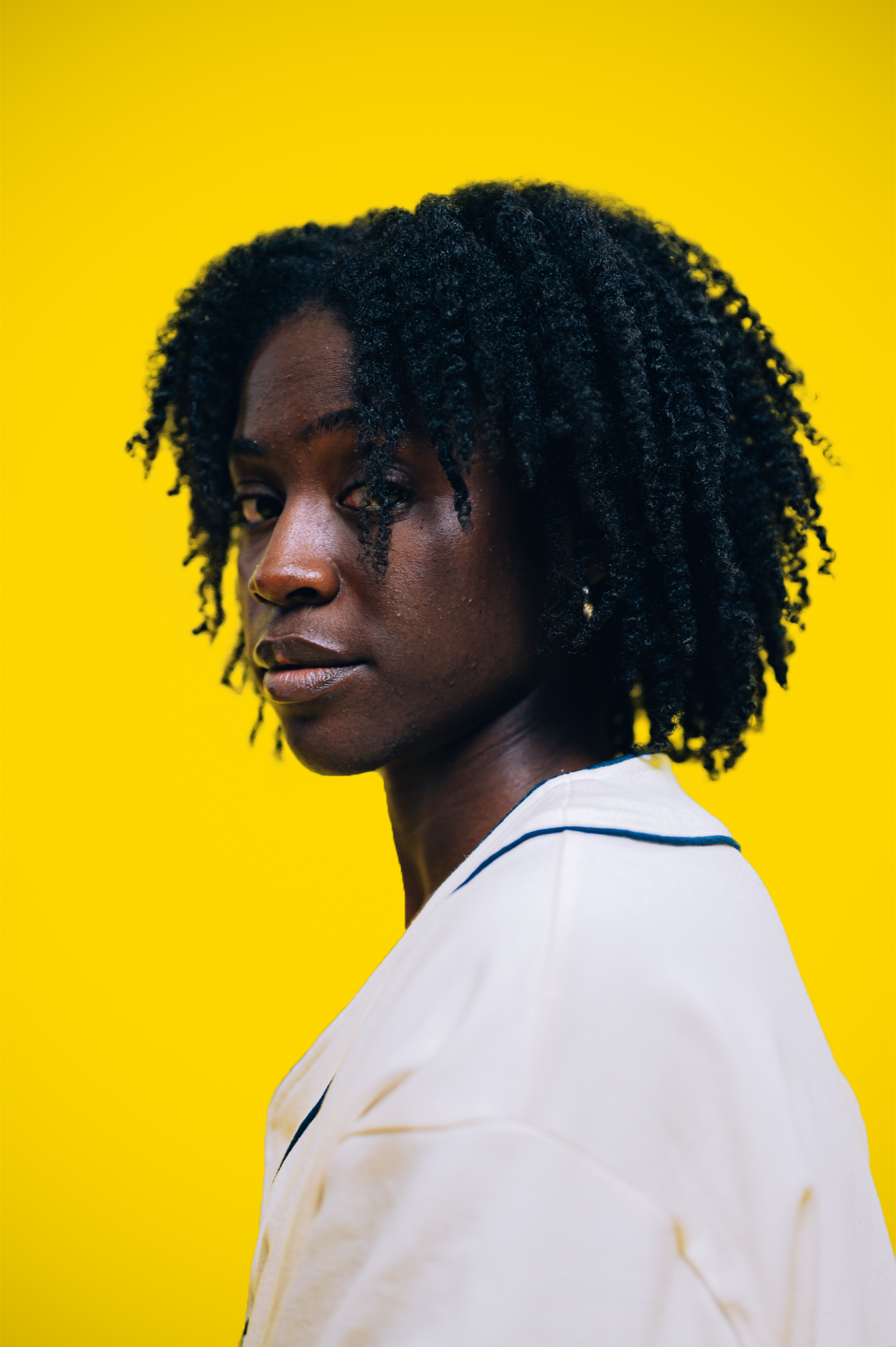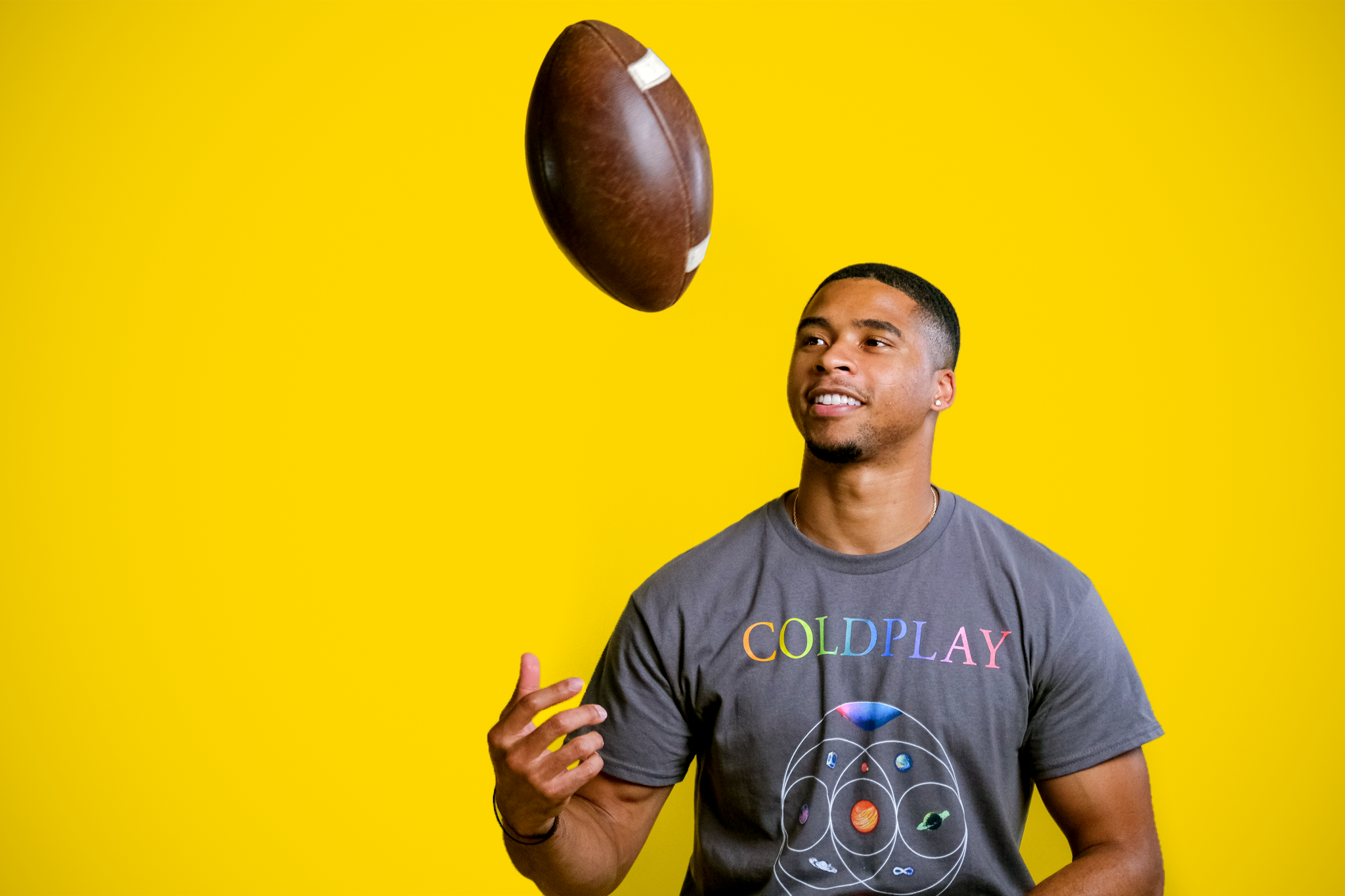
Purpose To Be Heard Presents
The Locker Room
Editorial
jamie Coleman
Former Alabama State Volleyball Player
Detroit, Michigan
I've always been involved in sports. I've always been involved in so many things. I was going from here to there every single weekend, and that's literally what I am doing now. I played every sport except for softball, and I haven't been in any dance classes. I was a skater, swimmer, and a bowler. I played basketball, ran track, and then I settled on volleyball, which almost did not happen, but shout out to my mom for getting my dad into making me.
Sports for me was a default. I had no option, and you just got thrown into it. I'm forever thankful for what sports has done for me because they taught me a lot of things around teamwork, commitment, and discipline. I think a lot of it is delayed gratification as well, which is a big part of my story, but it teaches you how to stay committed, even when things are really rough. I think the pressures you get, and the highs you feel when things are great, but the pressure and the lows you feel when things are just going really bad is what I learned. I tore my leg at one point in my career, I got rejected from a team I have been playing on for years at one point, but I overcame all of that stuff.
We built 7th Ave in the time of the pandemic. We wanted it to be the Black Clubhouse, so purely a social audio space, but for people of color, because when the pandemic happened, we had no safe spaces digitally. We raised just under $4 million to start this project, which was phenomenal for all Black investors outside of Twitter. We were very proud of what we were doing, but we quickly realized that was just something that people really did not want. We completely pivoted to something, which now functions towards the creative economy. That's for anybody that creates TikToks, newsletters, podcasts, and things like that. What we have provided is an end-to-end solution for creators that will allow them to consolidate their digital identity, deepen their relationships with their current followers, and then sell directly to them.
It's very important for me to empower and feel like I can create a space for Black folks, just because I understand a lot of the privileges that I've been able to acquire over the years. Even with me being a full-time athlete, I was able to still have internships and study abroad and even work at Google. It was only fair that, given the space that I'm able to walk into, I'm only able to open the door for others that come in behind me. I've always believed that we as Black folks are not dumb, stupid, or lazy, we just typically lack the resources and exposure, so if I'm able to provide that in any capacity, I'm always willing and wanting to do that.
I created culture therapy as a way to create a vulnerable, safe space for people of color, or really just anyone that comes across it to say, “Hey, this is my story, this is my truth. And because of that, I'm able to heal and kill these curses and create new cycles of wealth.” That could be mental wealth, financial wealth, freedom, or whatever. It really just started from me making a podcast. I was telling my story, and I'm having some great conversations with friends. I was seeing that we were all going through the same things where our family were not our biggest fans but our biggest kryptonite.
I've always enjoyed proving people wrong and that might be a bad thing. I've always enjoyed showing people that the impossible is possible. For me being at Google, people were like “If you go to an HBCU you won't get into big tech.” I was like, “Okay, watch me.” It was the same way with volleyball. All the different internships I was doing or me studying abroad and missing a couple of weeks of camp and things like that, they told me it would affect my play. I had an agreement with my coach where as long as I showed up, I balled out, and I knew what I was supposed to do, let me go do what I need to do because for me, I always understood volleyball was a means to an end, and I will be damned if I did all this work and then at the end I ask myself “What am I going to do?”
Creative Credits
Story Writer // Malik Brown
Creative Director // Tyrone McClendon
Director of Production // Nia Symone
Director of Photography // Scoot Took It
GFX Designer & Video Editor // Ethan Garner
Interviewee // Jamie Coleman @jmcoleman3
byron Johnson II
Former Southeastern Louisiana Football Player
New Orleans, LA
I think for me, Katrina taught me not to be so materialistic. At a young age you have life as you know it. You have a house, cars, all types of stuff, and then it gets taken away. You can get all of that back. We got another house, other cars, all that type of stuff. The year after that both of my biological grandfathers and my dad passed within that same year in 2006. I think it gave me an outlook on how to cherish the people that I have in my life.
During that time, I got rooted in my faith. When you get a chance to experience God for yourself, and you go through those trials and tribulations that kind of put you in the place where you have to actually live that out, it hits differently. So for me it did. I remember during that time really being rooted in my work. When my dad passed, I think more than anything I was at this place where I kind of gave myself an ultimatum like, you can either use this as a crutch, or you could use this as fuel to move you forward, and I chose it as fuel.
I knew that if I was getting a chance to go against the best players that this team had to offer and obviously kind of seeing what the team was becoming, which was a conference championship caliber team, I had to stand out against those guys and show the coaches what I'm made of. For me, it was going as hard as I possibly could every single day, and I really tried to make that just my MO. Nobody was going to outwork me.
I remember I called my best friend and I told him I was going to quit, just because of the ups and downs, being a walk on, and not feeling appreciated. It really started getting to me for like the past, like, month or two. He told me “You never know what God has for you, just stick with it.” I kid you not, I didn't think my coach knew my name. I walked into a special teams meeting and he was like “Is Byron in there?” I’m looking around, and at first I thought it was grades or something like that. I went to his office, and my receivers coach was there as well. He sat me down and said “I want you to know, we're going to put you on scholarship in January, is that cool?” I was like, “Oh, snap,” and I had this internal moment where I was just like, “God, I was about to quit 16 hours ago.”
One of the things that I'm most grateful for is I think what's allowed me to kind of transition even to this new field is that when it came to football, I know a lot of people who didn't really give their all. I gave it my all and I always could have peace in knowing that I squeezed every little bit of ability out of myself that I could, so make sure you're doing that, don't try to do it to be on Instagram for a post.
It’s going to be times where you feel like life is overwhelming or you feel like it's a lot. My friend told me “You can lay down, just don't unpack there.” That was a really important thing. I was going to have downtimes, but it was my family, friends, Jesus, you know, and the people that are closest to me that kept me going. That reminded me of my faith, that reminded me of what I stood for during that time.
I think I've found my purpose a long time ago. I think my purpose is to lead, motivate and inspire. I was doing it as a football player, coach, and now I'm doing it as an actor. I’'ve seen myself do the same thing in multiple ways, I think it's just the platforms that you get to do it. I think it's just understanding what that platform is at that certain point.
Creative Credits
Story Writer // Malik Brown
Creative Director // Tyrone McClendon
Director of Production // Nia Symone
Director of Photography // Scoot Took It
GFX Designer & Video Editor // Ethan Garner
Interviewee // Byron Johnson II @bjohnsonofficial
latrice lewis
Former Team USA Handball Athlete turned Mental Performance Coach
Kennesaw, Georgia
My dad is the elite soccer player, and he wanted me to get into activities. So he decided to teach me soccer when I was five, and that was my first sport ever. I started to bond with him, and I started to watch a lot of sports. I got the attention from him because he was teaching me sports. I wanted more attention, so I decided to watch sports with him, and this kind of developed into a competitive thing.
I tried out for my first elite soccer team when I was eight, and that was the first time ever I didn’t make a team. I remember going back to my dad, and he sat in the car during tryouts. I told him I didn't make the team, but it was okay because the coach said it was okay, and it doesn't make us not winners. He was like, “You are never doing this again. From this point on, you make every team.” So we put in the work, and I told myself I'm not going to not get picked anymore.
I had a lot of pressure. My whole identity was on being an athlete, I was referred to as “The Athlete.” People didn't use my name half the time. I knew that my dad would continue to give me attention as long as I was making the top teams and I was winning, so that kind of became the relationship where I built an identity around that I had to win. It wasn't even necessarily pressure, I expected to win and be better than other people.
Failure didn't happen often. Failure just meant that I had to work harder. Failure was temporary. So I never really let it get me down. There were times when I did fail, and my dad made sure to make sure that I knew that it was unacceptable. I was that kid who would have to walk home, or not have dinner, or not have dessert. It was clear that this is the punishment.
2014 was when I finally was like, I'm not doing this anymore. It actually stopped being fun. I realized I didn't care about winning anymore. I didn't need to win. It wasn't part of who I was, and it didn't change who I was.
I experienced a lot of loss around the time that I retired. So from about 2005 on I lost my fiance to a tragic accident, and I lost some friends. Part of my identity felt lost there because those were my connections outside of my identity of sports. So with sports also leaving, I was very much stuck with, “I don't know what to do with myself.” So I actually spent a year doing nothing.
I kept in touch with my sports psychologist. I had one as an athlete. I had a severe back injury that took me about a year and a half to recover from and because of that, I got assigned a sports psychologist through the USOC and kept in touch with him. One day was like “Latrice, you can do this. You have everything in your background to help athletes.” I thought a lot about it, I did some research, and I was like, “I could do that.” I also recognized that I was somebody people like to talk to in general. I was like I could do counseling, too. I could do both of those things.
I would have had an easier time as an athlete. I would have separated my identity from sports. I would have known who I was. I would have saved myself a lot of time from being lost. So I want to help athletes with that. I struggled with my transition out of sports, and a lot of athletes struggle, a lot of athletes end up depressed, and suicidal. So I want to help athletes with those aspects. But also, I was a very successful athlete. I don't try to be humble about it with people. I learned tools that made me successful. Once I got my education, I realized I was using scientifically proven tools I just didn't know I was.
If you ask athletes how much of their game is mental, they'll tell you that pretty much 80% of it is mental, but they're not putting in those reps. And if they really want to be successful, that's how they're going to get it and they can get that knowledge on their own, and they can seek help on it with people like me.
Creative Credits
Story Writer // Malik Brown
Creative Director // Tyrone McClendon
Director of Production // Nia Symone
Director of Photography // Scoot Took It
GFX Designer & Video Editor // Ethan Garner
Interviewee // Latrice Lewis @beastswithtrice
coach Norris “bo” bell
Former Professional Overseas Basketball Player
Atlanta, GA
I grew up in the projects, and I have four brothers and four sisters. We lived in a two bedroom apartment. There were no father figures in the home, we had seven different fathers, so I had to grow up fast. I had a total of 11 jobs between ages 11 and 17. I lived only like a mile from Georgia Tech, so what I used to do because I had two younger brothers, I used to go to hang out at Georgia Tech, because one of my jobs was selling popcorn and Cokes at football games. I made friends with the football players just to get out of my environment, so they used to give me football equipment. I’d bring the football equipment back, go to the Salvation Army, and buy T-shirts. I'm only 12 years old at this time. I put numbers on the T-shirts, and I created a league with my little younger brothers and their friends in a section of our apartment.
My passion was football until I broke my leg. I was naturally good at football, so when I broke my leg, I started growing and working out. We had a football field where we lived and the light stayed on all night. I would stay up until sundown. I knew sports was going to be my way out because academics in school wasn't a priority in my house because my mother didn't know. She was by herself so I had to kind of find my way. I became a father to all my younger siblings, so I had to grow up quickly. So I just kept working out and then I started growing. What I learned through this whole process was when you serve and help others through your process and your struggles, the energy and the universe will bring energy to you that will help you with your life.
My mother was having issues with bills, so I left school and went into the police academy. I never stopped working out. I knew things were going to change, I just didn't know how, but I stayed true to the game. I kept working out. I went to the gym and worked out all night. One of my routines, I would run through the graveyard at night. I was doing some sick stuff but I was obsessed with development because I had to make it. I didn’t have a plan B. When you have a plan B you never put everything you got into the plan A. By chance plan A doesn’t work, I get another A, because I didn’t operate in Bs.
I took the money I made at the academy, and paid my way to go to the Hawks training camp, and they signed me to a contract. It wasn't guaranteed. I was getting so much press in the newspaper. The headlines said “Ex-police officer signs contract with the Hawks.” Everybody was going crazy.
I use basketball as a platform. For me, it's a form of ministry. I can do a lot of other things. I had a job in 2011, and I was the head coach for a pro-team in Canada making six figures. I quit, because it wasn’t fulfilling. This is what I was supposed to be doing. When I retired, I was an investor making a lot of money from playing, but I was still charting buses and traveling around the country. I had kids in five-star restaurants so they could sit down. You had to wear a tie, and you're going to eat a starch, meat, and vegetables. You're going to drink water, and I was teaching them how to eat with a knife and fork. What I've always been able to do is try to use this platform to help and to change life and give kids a navigational system and some life fibers so that they can go on and do whatever they want to do in their lives.
When I watch these kids go be successful and they have families, and then they come back and do what I do, that's the reward. You got four stages: the conception stage, the development stage, the maturation stage, and then you have the transfer generation stage where you have to go back and pay it forward, pay it back. When I watch kids and players that came through me, and they’re productive in life, they don’t owe me anything. I did my part, It's up to you what you do with it. When they just say, “Thank you,” it's even more rewarding, but when they don't, it doesn't even matter. Because I'm not doing it for that. I understand my purpose and I'm passionate about my purpose, I'm passionate about what I do. It's all about changing lives. It’s bigger than basketball for me.
Creative Credits
Story Writer // Malik Brown
Creative Director // Tyrone McClendon
Director of Production // Nia Symone
Director of Photography // Scoot Took It
GFX Designer & Video Editor // Ethan Garner
Interviewee // Coach Norris “Bo” Bell
@bobellbasketball
brea elmore
Former Memphis Women’s Basketball Player
Stone Mountain, GA
I was five when I started playing basketball. My dad helped me grow that competitive edge. We'd be in the backyard almost every day until the sun was down. Sometimes he'd throw the ball across the yard and make me so mad. But I had to go get it, and I had to play. It really helped me stay competitive and build that strong grit in me.
I can't pinpoint the moment that I knew I could make basketball out of a career. When I talked to my brother he said he saw it in me. I was just doing what I love to do, so I never really saw myself going to college for this. It just all kind of came, but to pinpoint it I would say middle school. That's when I think I said I'm pretty good at this.
As a four-year athlete at the University of Memphis, I would say it was one of the toughest journeys of my life thus far. Just coming in as a freshman, I was really confident, and then the confidence dropped and I started questioning if I could play. I lost my love for the game after my sophomore year because it was tough. I felt like there was a difference between coaching and tearing the player down. A lot of us freshmen felt like we were getting torn down. It was tough. It was a battle. Every time in practice, it would be the upperclassmen versus the underclass, and we were going at it because we wanted to play.
Losing my mom made me start going to counseling. I was dealing with that, and everything that came with basketball. My grades were slipping. I wasn't going to class. I wasn't doing work, because I wasn't there at the time. I remember just going into the office, and somebody told me “Try to bottle that up and put it in a box.” I felt so disregarded and disrespected. After that, I checked out and I went to counseling. It helped, but I still struggled.
I talked to my brother. We always talked, but moving forward, it was really hard. I felt numb for a very long time. I lost direction, but when I started my clothing line, I feel like that's when I was able to come back. Mind you, I lost my mom in 2016, and I didn't start my brand until 2020. That was four years of just feeling numb through life and not really knowing how to navigate it. I’m not in counseling right now, but I know how to journal and go outside and do different things to get myself back to myself.
When COVID started and they sent us home, I was like “What am I going to do?” I kept having thoughts of “What do you like to do?” I like to eat, and I want to be a chef. I like to get dressed. But I needed a message behind my brand. When I lost my mom to breast cancer, one thing she always just told me growing up was the only person that can stop you, is you. I took that and ran with it, and I started November 5, 2020. I never stopped and it helped me grow spiritually and mentally in life.
I feel like I haven't found my purpose because life is a journey. I'm always learning new things every day and I feel like nobody has one purpose. I feel like we're here to serve and do what we can to uplift people and bring them up. I feel like the more I go on my journey, the more I'll step into different roles with my purpose, but having just one purpose, no.
Creative Credits
Story Writer // Malik Brown
Creative Director // Tyrone McClendon
Director of Production // Nia Symone
Director of Photography // Scoot Took It
GFX Designer & Video Editor // Ethan Garner
Interviewee // Brea Elmore @brea.elmore
Dani Ocean
Former Alabama State Women’s Basketball Player
Warner Robbins, GA
Dani Ocean came from me playing basketball. It was kind of a dual name. One was for my teammates. They call me Dani Ocean because my shot was wet and then they called me that because of my drip and how I fix my clothes and they just love my style.
I developed my style growing up. I didn't have much, but my dad always taught us to make sure if your stuff is ironed, and there are creases in your clothes, then you can make anything look good. That's why I developed my style. I always dress my outfits with socks, so I would normally wear a white t-shirt with cargo pants with some nice socks.
What inspired me to create Trap Smart was the discouragement of someone not wanting my first initial brand, Dani Ocean and then wanting to pivot and show kids to not give up on a dream. That’s when Trap Smart came about and I decided to go ahead and launch it during the pandemic because I wanted to make it perfect.
I was inspired by my brother wanting to play basketball. I saw that he was getting a lot of attention from my dad because I always wanted to be on an AAU team and he wouldn't let me because he thought I wasn't ready. I was determined to be on a team and I wanted my dad to coach me. That's what really inspired me to get into basketball and it was up from there. I just stuck with it through trial and error. It became a love for me eventually.
College basketball was tough, but I feel like there were so many lessons in it as far as wanting to go back home just because of the comfort of my mother and dad. They were always telling me that I had to stay out there and I could do this. My freshman year was kind of rough as far as being focused on coming here to play ball. I wanted to visit home too often. So my dad and mom made an appointment to come to all the games, and I had a good freshman year. I ended up starting towards the end of my career by just staying focused and motivated.
I feel like my purpose is to serve and speak the good word through whatever it is that I'm doing. Right now I have my brand which is Trap Smart. I feel like I can serve and motivate others to stay focused on their goals, and take those risks that may feel uncomfortable, but knowing that if they do it, it will likely get them to where they need to be as far as achievement goes. I feel like I have found my purpose because your purpose can be anything as long as you're serving God.
Creative Credits
Story Writer // Malik Brown
Creative Director // Tyrone McClendon
Director of Production // Nia Symone
Director of Photography // Scoot Took It
GFX Designer & Video Editor // Ethan Garner
Interviewee // Danielle Gazaway @daniocean
dr. jacquinda jackson
Licensed Trauma Therapist
Simpsonville, South Carolina
What interested me in becoming a therapist was my life experiences as a child growing up and knowing where I was, I didn't want to be there so I got lost in books. When I got to college, I had no earthly idea what I was going to major in. My professor pulled me aside and was like, “What do you like to do” and said I like to meet with people. I like to talk to people. So I majored in sociology and it took off from there.
One simple thing that people can do is take breaks away from social media. Social media has a way to cloud our judgment, but on the flip side of that, people only post when they want you to see, so it creates this false sense of reality. If we take time away from social media and become intentional about spending time with people who are close to you or in close proximity with you and being present in the moment, it will allow you to not only feel your feelings, but be able to share empathy with other people.
Oprah was my first role model. My mom used to clean houses and when I would go with her, Oprah would be on and she would interview everybody, but she also looked like me and I knew if Oprah could do it, I could eventually do it.
My favorite artist is Meek Mill. When I hear Dreams and Nightmares, it’s the balance in which we try to figure out life. There will be very high highs, but also very low lows and we have to be able to manage the low lows in order to appreciate our high highs.
What I see now in athletes is that they need to always be on go and be on performance level. The reality of it is, that you can't live like that. It creates this internal anxiety for a lot of athletes, and young children because they are then seen as somebody who “does” and not seen as somebody who has purpose, takes up space, and has a life to live outside of what they do.
I know I have found my purpose, but I haven't reached my full purpose potential. My full purpose potential is to work with those not only leadership, but those who have access and decision making because how we shift and view mental health starts from the top and trickles down to the bottom.
Creative Credits
Story Writer // Malik Brown
Creative Director // Tyrone McClendon
Director of Production // Nia Symone
Director of Photography // Scoot Took It
GFX Designer & Video Editor // Ethan Garner
Interviewee // Dr. JacQuinda Jackson @dr_jaquinda_jackson
cj wilson
Professional Overseas Basketball Player
Portland, Oregon
I'm originally from Portland, Oregon. I moved to Georgia when I was 14 years old, and it was a complete culture shock. It’s totally different than anywhere else I've ever been. I definitely felt alone because I didn't have any family here. When we made the move, it was just me and my mom. I made friends through sports whether it was football, basketball, track, or any sport I could be a part of. That's what I wanted to do.
I was recruited pretty heavily in high school for basketball, but ended up not going to anyone due to adult mishaps. Some college coaches were telling people I was signing here and committing here. Other schools pulled their offers, and now things were back at square one. It's a part of the business, which I understand, but I got the short end of the stick.
At the end of your senior season, you kind of start to look and see something isn’t right. So I ended up opening my recruitment back up to other options because it's almost graduation and it’s time to decide where to go. Young Harris was not at the top of my list at all. I was down to Columbus State and Young Harris. I told my college coach the day of graduation that I flipped a coin to decide where I was going to school. He called me and I told him I needed to make a decision because signing day was the next day. I went to the bathroom and flipped a coin. Heads was Young Harris and tails was Columbus State. It landed on heads, and I called the coach from Young Harris and told them I was coming.
My freshman year, I was two votes shy of winning Freshman of the Year, didn't win. My sophomore year was also pretty good, and we were pretty good. I said, this is it, I'm out. I go in to tell them I'm not coming back. To do that, you have to get permission to leave from your coach, your athletic director, or the president of the school. They all said no, and I was confused. I waited about a week or two, because I had Division 1 schools already calling and were interested. After that it was more so of a are they're going to drag this out, and you're going to be stuck here. Which makes sense for them. But it didn't make sense to me.
I think my biggest advice would be don't be jaded by the business side of things and actually do something that you like to do and enjoy. Another thing would be make sure your decisions are your decisions, and they're the best ones for you. I don't think that's something that I did growing up. I think I made the decisions that people wanted me to make and knowing what I know now, I definitely would have done a lot of things differently.
Creative Credits
Story Writer // Malik Brown
Creative Director // Tyrone McClendon
Director of Production // Nia Symone
Director of Photography // Scoot Took It
GFX Designer & Video Editor // Ethan Garner
Interviewee // CJ Wilson @cjwilson_2
chris palmer
NBA/WNBA Skills Trainer
Atlanta, GA
Basketball was always my passion growing up, and I loved the competitiveness of it. I wanted to develop my game and play at the college level.
Going into my freshman year of high school, I was a 5’10 shooter, so I wasn’t a big or athletic player, but I knew I worked hard. I really wanted to put everything I could into the game. Going into my sophomore year, when I grew a little bit, I just made it a priority to reach out to as many coaches as I could, probably almost 1000 colleges. I was just writing personal letters and doing everything I could from a responsible standpoint off the court, as well as training myself and just trying to become the best player in the hopes of one day getting a scholarship.
I went into college not knowing what to expect, specifically in the classroom. All the deadlines, and there's no one holding you accountable. It's on you. There's going to be consequences, but no one's going to hold your hand and get you through that. At the beginning, I was just focused on going to the gym every day at 6 am like I was doing in high school and just working as hard as I possibly could. I think midway through the year, I was able to balance out school and basketball in a more time effective way.
From a basketball standpoint, and a lot of people will see this when they go into college, you're not as good as you think you are. You’re playing against bigger and faster players. I think that was the first roadblock of adversity when it comes to being on the court. You have to humble yourself and find ways that you can get better and control what you can control on the court, so I would say that was the first roadblock. I would definitely say my sophomore year I had a lot going on. My dad was diagnosed with cancer that year, so in the middle of the season that was a very stressful time. Mentally, that year was a bit tough, and then just other stuff going on. It was a hard year for sure.
I didn't really know anything about mental health or battling adversity because nothing crazy had happened until some of those moments in college. I would say something that helped me during my sophomore year was taking up yoga and doing some meditation. I had no idea what to do, I was just going on YouTube and doing some random stuff that helps. I also reached out to family, friends, people that I trusted, and was able to open up to them at a level that some wouldn’t be comfortable doing. That was very important for me.
At nine-years-old, I knew I wanted to be a college coach. I wanted to get into basketball, so I actually did my first camp when I was 13 years old. I ran a basketball skills academy. I advertised and did a basketball camp, not really knowing what I was doing, so it started there. Then when I was in high school around 16 years old, I started training some kids in our organization that were younger, and I started charging $10 an hour. With that I built some clientele throughout the time I was in high school. During the summers in college, I came home and then I had some high school players that I was working with, and I believe somewhere during my sophomore year, I started working with my first overseas Pro.
I think my purpose is to honor Jesus in everything I do. I think my purpose on this Earth is to be a light in someone's day and to help out when things aren’t going well and stay by people's side. I want to try to bring as many people up to heaven with me.
Creative Credits
Story Writer // Malik Brown
Creative Director // Tyrone McClendon
Director of Production // Nia Symone
Director of Photography // Scoot Took It
GFX Designer & Video Editor // Ethan Garner
Interviewee // Chris Palmer @chrispalm13
Devin mitchell
Former Georgia State Men’s Basketball Player
Chicago, IL
My first sports role model was Michael Jordan. I grew up in Chicago so you couldn’t miss it. My grandparents were big Chicago Bulls fans everywhere. My grandmother and my grandma on my mom's side are big sports fans. Michael Jordan was all over the house. He was all over the city.
My favorite thing about working with high school basketball players is I'm back at my high school working. That's where I grew up. That's where I played and it's a different feel with the kids because you’re seeing them go through the same things you've gone through. My least favorite part is patience. That is where I have to grow. But it was fun. Being back in my community with those kids was a good experience for me.
Going to Alabama, they recruited me pretty hard but they kind of came in at the end. I had a teammate that was playing AAU with me. He was a point guard and he was always able to find me on the court. I was a shooter, and you want to play with a point guard that’s looking for you and I was able to knock down shots all summer. I was like, “Yo, wherever you’re going to school, I'm going.” So he ended up coming to Alabama. I loved playing in the SEC. Unfortunately it didn't work out. The coach ended up leaving and I transferred to Georgia State. It was a no brainer, coming back to play for those guys and I was able to do some really special things.
As far as being ranked high, I was super competitive. I'm a Jordan and Kobe fan, so that stuff didn't really bother me. I wouldn't say it was pressure, per se, but you always want to play well, you always want to make sure that when you're out there, you are going to play well. From that standpoint, I wouldn't say it was pressure, but you do have a certain responsibility to be who they say that you are. That's like the give and take with that but it helped me. I felt like I was more prepared because I didn't want to show up and not be who they said I was or be who I thought I was.
You have to run your own race. That's what I tell the kids now, run your own race and set your own standard. Those are the two things you can do to keep you locked in. I lost track of it at one point when I went to Alabama and left to go to Georgia State which was a lower conference. It was different for me. I went from playing in a 15,000 seat arena every night, to Georgia State where it’s maybe 3000 people in the arena. And if you don't win your conference, you don't go to the NCAA tournament. It was different for me so I had to adjust and get back to it. It was definitely a challenge.
I would say I’m not sure if I found my purpose yet. What I would say to everybody is dive into everything. You're not going to know what to get into until you do it. You have to be able to adjust and I think that's why athletes are looked at a certain way, because we're good at that. We adjust quickly, and every game is different. Every scout is different. All those things come into play when you're in the real world and if you haven't experienced that, it's going to be really really hard for you to find what your purpose is. You might end up doing something that you don't want to do but I think we're lucky as athletes because we get to go through that.
Creative Credits
Story Writer // Malik Brown
Creative Director // Tyrone McClendon
Director of Production // Nia Symone
Director of Photography // Scoot Took It
GFX Designer & Video Editor // Ethan Garner
Interviewee // Devin Mitchell @__devinmitchell
montavius coleman
Former Morehouse College Track & Field Member
Decatur, GA
Community means everything to me. I got active in the community when I was going to Rainbow, and I was right across the street from Southwest Dekalb. They always came to my school when we had our little drug free pep rallies and I would see the football players. The blue and gold uniforms and my granddad taking me to games was kind of an attraction. Being in that community was an attraction for me and all the great sports athletes that came from that community that stuck around and coached through my times in middle school
I started playing sports as a young child playing football. I think about every young child that was a boy that played football. I got into track and field in middle school. My coach, coach Sheppard, wanted me to do the Shot put when I was in the seventh grade. So I got involved through her seeing that vision in me. I wasn't good technically in middle school and seventh eighth grade doing Shot put, and I was probably the worst one. I kind of stuck with it as I got into high school, and I started doing some great things.
Sports means everything to me. I think sports teaches kids and adults responsibility because it’s something that you want to do in life, so you have to be accountable and responsible for your actions if you want to succeed. If you don't want to succeed or if you're not good, it shows in your work ethic. So whatever you put in, you'll get out, whether that’s going to work, school or anything you want to get in. I used those same concepts through life and that kind of helped me get into sports and be able to go through something organized.
A lot of the stuff on the East side was just kids being superior athletes, so I wanted to take it upon myself to actually learn what personal training was, and then when I went to Morehouse, I kind of indulged more into strength and conditioning, which is the upper scale of personal training.
When you mentor the right way, it means a lot. Me being a mentor, I kind of show my students and my athletes my failures. I'm not a guy that's going to mentor you through all the right things. I want to let you understand that sometimes you have to not listen and witness stuff for yourself, and then be able to come back and I can tell you, “Yeah, I told you that you were Tgoing to do that.” But you have to go through there to get better. Growing up, I saw a lot of mentors trying to paint the perfect life.
A lot of my mentees adapt to the wins and losses, and they come back and say, “Dang, coach, I remember you told me that.” I still try to have mentors at this age to where I can say, “Hey, I'm going down this path. I want to do it this way.” But I know there's going be a lesson behind it. I still want to be able to still educate myself. Even though I'm mentoring, I still need to go to my mentors, and that's the biggest joy for me.
Creative Credits
Story Writer // Malik Brown
Creative Director // Tyrone McClendon
Director of Production // Nia Symone
Director of Photography // Scoot Took It
GFX Designer & Video Editor // Ethan Garner
Interviewee // Montavius Coleman @coach1coleman
Myles Cardenas
Former College Basketball Player
DeKalb County, GA
At a young age, it was really all about basketball and family. I grew up playing basketball. I think I started at five years old at Lucia Sanders Rec Center. My auntie was one of the biggest influences, and she got me into the rec center and that was the only sport ever played. At a young age, it was just basketball all the time. If I wasn't playing at Lucia Sanders I was following her around and or we were working Pro Am leagues every summer. I got a chance to be on the basketball scene all the time, whether I was playing or sitting at the rec center or at the Pro Am leagues handing out jerseys or checking players.
I was all about going to the NBA, because that's what I saw. I didn't really have any dreams to do anything else except for when I started to realize that I needed to have a plan B just in case. In elementary and middle school, I definitely knew iit was something I wanted to do for a long time, something I wanted to go to college to do, and something I wanted to do after I graduated college.
Growing up, I had goals on my wall and things that I've written down that said I wanted to go to school for free and play basketball somewhere. My biggest thing was just making sure that basketball took me on to the next level after college. But I took a very non-traditional route. I didn't get my first offer for junior college or anything related to going to college and playing basketball until the wee hours of my senior year. I didn't get my first offer or two until around July going into my freshman year of college. It was one of those things that I just had to keep fighting to the end of the clock to even get an opportunity to go to college and play basketball.
Therapy helped me realize that basketball at a point had been all I had played and ever did. I didn't really do anything outside of that, and it was the main part of who I was as a person. I think when I started taking therapy, it made me think more about what my purpose was. At that moment I really honed in on what I really wanted to do in life after basketball, and it was still unclear. I knew at that point that if I didn't really know going to therapy was allowing me to think positively and find my purpose. Now, I probably wouldn't be where I am today.
Purpose for me is helping people, whatever that looks like. Whether it's real estate, outside of real estate, sports, or financial literacy. Anything that I've started a business doing, or had an idea or concept of doing has been centered around helping people.
Creative Credits
Story Writer // Malik Brown
Creative Director // Tyrone McClendon
Director of Production // Nia Symone
Director of Photography // Scoot Took It
GFX Designer & Video Editor // Ethan Garner
Interviewee // Myles Cardenas @emceethree
Bre’ana “bre” singleton
Former University of West Georgia Women’s Basketball Player
Decatur, Georgia
I was introduced to sports by Space Jam, when I was one-years-old. I watched it as soon as I was of age, and could really understand what was going on. I fell in love with not only basketball there, but music as well, because the soundtrack was fire. I told my parents I wanted to play, and they got me a little hoop, and it was up from there.
I started experiencing anxiety surrounding basketball pretty early. I remember there was a point where I joined a really, really good basketball team, which was the Georgia Ice where they had former and current WNBA players on my team. I didn't know it then obviously, but I can tell you there was a difference in the level of play. I was fortunate enough to be on the team, but I knew that there's some people out here that are better than me. That kind of took a toll on me from a young age.
I always took basketball pretty seriously. I think from the time I picked up a ball, I wanted to be really good. I think from early age, I realized that I can maybe get to college, and that became a goal really early. Maybe around middle school I was like, “Okay, I might be a really, really good player.” From there. I just worked really hard, and I got on some pretty good teams.
Everywhere I went it, everybody knew me as Bre that plays basketball, Bre that's on the basketball team, and Bre the basketball player. It’s not that I didn't like it or that I wasn't proud of it, it just kind of became attached to who I am. That didn't allow me to get away from the title until I stopped playing because I really wanted to be known for other things. I had a bunch of different interests. I liked sports, music, journalism, and a bunch of different things. It was never all just about basketball for me.
I was one of those people who believe it or not, couldn't wait for basketball to be over. I couldn't wait for the next phase of my life and the next chapter, because like I said, I had been “Bre who plays basketball” for 21 years up to that point, so it was like a countdown for me. I was just ready to be somebody else and to do some other things. Once the last buzzer sounded, I was grateful for the experience, and definitely ready to get to the next chapter of my life.
Most people look back and regret it as one of those moments like where they think they’ll never get that feeling back again. I'm kind of glad that I looked at it this way because I don't have these moments where I wake up and say I wish I was still in this chapter of my life. I can fully embrace moving forward and who I am now. I look back on those times, and I think they helped me get to where I am now.
I came up with the idea of Free Game in 2018. At that time, I was doing radio. So after I graduated from University of West Georgia and played basketball, I went straight into radio. After that, I got furloughed when the pandemic started, and I had a bunch of free time. One of the things I wanted to dedicate my time to was the student athletes who might have been like me, and maybe they did want to go pro, or maybe they had aspirations to continue playing longer than I did.
I wanted to take that time to build a business or foundation that can help them be a well rounded individual, because I think I took that process more seriously than a lot of my peers. I was more prepared for when the buzzer sounded, and the ball stopped bouncing. I wanted to take the time to make sure that other student athletes were at least thinking about it, or had it in the back of their mind, because whether you like it or not, the ball stops bouncing for everybody at some point.
Being an athlete means that you have a body, and you're physically able to do anything. You can be an athlete whether you're in a wheelchair or you’re able to walk. As long as you can get up and be disciplined enough to complete some sort of physical activity, I think you're an athlete, and I think being an athlete is one of the more unique experiences that you can get as a human being because it teaches you so much, not only within the sport, but outside of it. The intangibles that you get, the dedication, the mental fortitude, the discipline, and the time management, those are things that you can't really replicate in certain situations in life like you can in sports.
Creative Credits
Story Writer // Malik Brown
Creative Director // Tyrone McClendon
Director of Production // Nia Symone
Director of Photography // Scoot Took It
GFX Designer & Video Editor // Ethan Garner
Interviewee // Bre Singleton @brestyle.mp3
justin longstreet
Former Clark Atlanta Men’s Basketball Player
Decatur, Georgia
I’m a family man. I love my family and friends a lot. I base my life around them, and I try to keep everybody together. My family brings me a lot of joy. I'm funny, and I love having fun. I’m basic, I don’t do too much. I’m not all in the scene, I like to be behind the scenes.
I’ve been playing basketball since I was five, but I was playing baseball a lot at first. I took a break because I was playing baseball so much, but when I really locked in, I locked in. Then I stopped playing because it became too fast. They were throwing the ball too hard.
The highs of basketball is meeting new people and building relationships with people you thought you never would. You get to travel the world, especially playing in AAU and college. It’s fun, but there are a lot of lows. As you get older, it’s a lot of politics. People might overshadow you because you’re not 6’8. When you're playing college basketball, of course they want so much out of you, but you got other stuff you got to worry about because you're grown. Your coaches will kick you out of school if you’re not doing what you’re supposed to do, but you got so much on your plate. So now it starts messing with your mental. Now you're thinking, “Do I want to play basketball anymore? Do I want to quit?”
The Atlanta Celtics were my first AAU team, and one of my first teammates was Terrell. He was my first teammate when I was 9 or 10. On October 27, 2013, he passed away in the All-Star game. He had a seizure and was right next to me. I carry him around a lot, and I have a wristband with him on it, and a tattoo of him. He was like my brother.
Everybody that knew ‘Rell knew all he wanted to do was play basketball. He was about to go to Miller Grove before it happened, so it was like he got his basketball dreams taken away from him. I think Florida State was supposed to come in the next day to see him.
After that, I really didn’t have much of a passion for basketball, and it made me look at a lot of stuff differently. I cried for a week straight, and I couldn’t stop. To see him pass away playing the game that he loved messed up my mental. I don't know how everybody else got through it, but I got through it just day by day. It didn’t happen overnight.
CSI Miami got me into Forensic Psychology. I just started getting to it like some years ago, but I watch it every day. I just go and binge watch it. I didn’t know I was watching when I was little until I started getting older. I kept watching and was like this is what I want to do.
I’m thinking about the future, but not too much, because I don’t want to be caught up in stressing myself out. I like living in the moment because I might not get this moment back. I got a lot of emotions. It’s kind of overwhelming, but it’s fun and happy emotions.
Creative Credits
Story Writer // Malik Brown
Creative Director // Tyrone McClendon
Director of Production // Nia Symone
Director of Photography // Scoot Took It
GFX Designer & Video Editor // Ethan Garner
Interviewee // Justin Longstreet @justinlongstreet_
Michael Davenport
Former Morehouse Men’s Golf Athlete
Atlanta, Georgia
My dad played baseball at a young age, so playing tee ball was like a requirement for me. So I played up until whenever you could start, which was five all the way up to 12 and under, and that's when the transition happened into golf. I played golf from 12 and under, which was like middle school all the way through college.
It got to the point where I was kind of tired on my dad coaching me because it was always like What am I doing wrong, and I'm only child. So I'm like, if I'm counting on all these other guys to make plays the same way I am, I want to get the same accountability.
I kind of realized at a young age that I wanted to do something with money or with math. So when I got introduced to the game of golf, I was like this is just baseball without the ball moving, so let me get into that, and it'll work in my favor when I want to get into that business accounting field.
Golf was going to be a financial engine to help me get through college, so once I realized that you don't need that money, you know, on top of scholarships and other grants that you get, that was going to be something that's going to help you get through it. Golf was never a thing that I was like, ‘I'm gonna go to a PGA and do it’ because I didn't really have a love for it like that. It was more of this is the engine that gets you to where you want to go. And you have to get a degree for it.
When I got done with golf, I was relieved because the pressures of school were so heavy on me. Even though you had an excuse to miss class they didn’t give you grace for that. It was kind of like “Well you missed this, so catch up.”
All throughout college, I was like, I can be playing baseball, and be killing and not have to not have to worry about the racial profiling that happens in golf and all the other politics that happened in the game, especially for for Black players period, whether you're male or female.
Once the pandemic hit, I realized that I didn't have my job to escape to, my master's degree was done, and everybody was at home. I realized that I really missed baseball, because I knew I was good, but I let it all go because of how I was feeling at the moment. When you're 12, you don't really know what joy that was going to take away moving into another sport when you're already good at another one.
Baseball happened when I was really young, so that's where my Earth, Wind, & Fire roots were deep. Golf reminded me of “Practice What You Preach” by Barry White. So those are the two different sides I knew. In baseball there was going to be a time where you had to make a choice. You love it, but you know what's annoying you, so are you going to be able to deal with that? That's the way of the world. With golf, people were going to be on my back a lot and there was going to be a lot of scrutiny, but there's something on the other side.
Creative Credits
Story Writer // Malik Brown
Creative Director // Tyrone McClendon
Director of Production // Nia Symone
Director of Photography // Scoot Took It
GFX Designer & Video Editor // Ethan Garner
Interviewee // Michael Davenport @mikesosmoove
rian mobley
Ri
Former Georgia Southern Women’s Track Athlete
Augusta, Georgia
I think a lot of us that do play sports, we've done it so long that we don't know who we’ll be without it. That was kind of my thing. Like, what is this? I've been doing this all my life, and what happens once I'm done?
I'm still competitive, but it's not as hard to the point I’m thinking I have to be first all the time. There's room for everybody to win at this point, and I think that's given me a lot of freedom and peace that I didn't have before.
When I had to tell my coach I was done with track, I had a whole breakdown to be honest. He knew what I was saying, but I wasn't saying anything because I was too busy crying. After playing sports, I can say I'm still learning more about myself. I'm an artist and a storyteller. I am both of those things, and all those things. I explore and transcend time. I'm still timely and keep up with my schedule, because I think I will never be able to get rid of that part and getting up early, but it works in my favor.
Creative Credits
Story Writer // Malik Brown
Creative Director // Tyrone McClendon
Director of Production // Nia Symone
Director of Photography // Scoot Took It
GFX Designer & Video Editor // Ethan Garner
Interviewee // Rian Mobley @_rianlmobley





